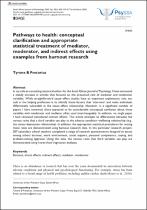Pathways to health: conceptual clarification and appropriate statistical treatment of mediator, moderator, and indirect effects using examples from burnout research
Abstract
In my role as consulting statistical editor for the South African Journal of Psychology, I have witnessed a steady increase in articles that focused on the presumed role of mediator and moderator variables. While straightforward cause–effect studies have an important explanatory role, our task in the helping profession is to identify those factors that ‘intervene’ and make individuals differentially vulnerable in the cause–effect relationship. However, in a significant number of papers I have reviewed, there appeared to be considerable conceptual confusion about these variables with moderator and mediator often used interchangeably. In addition, no single paper I have reviewed considered indirect effects. This article attempts to differentiate between the various roles that a third variable can play in the adverse condition–wellbeing relationship (e.g., the stress–depression relationship). In addition, the appropriate statistical procedures for testing these roles are demonstrated using burnout research data. In this particular research project, 207 secondary school teachers completed a range of research questionnaires designed to assess among others burnout, work environment, social support, personal competence, coping, and problem-solving appraisal. Using this data, the various roles that third variables can play are demonstrated using hierarchical regression analyses.

